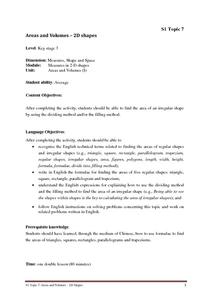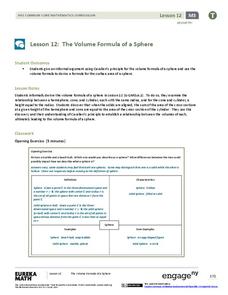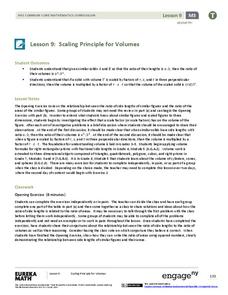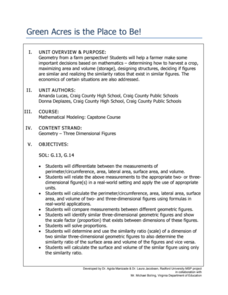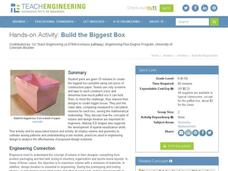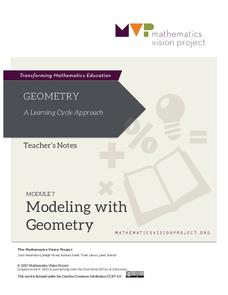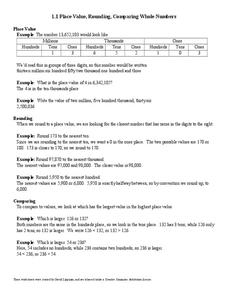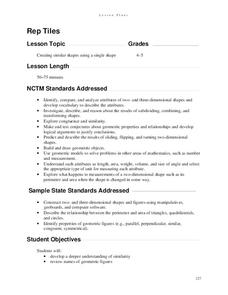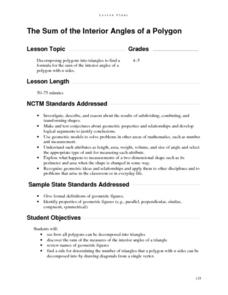Virginia Department of Education
Exploring 3-D Geometry
Take young mathematicians on an exploration of the world of 3-D geometry with this seven-lesson unit. After first defining the terms perimeter, area, and volume and how they apply to the real world, students continue on...
Government of Hong Kong
Areas and Volumes - 2D Shapes
Unfortunately for young mathematicians, the world isn't made entirely of parallelograms, triangles, and trapezoids. After first learning the area formulas for these common shapes, students apply this new knowledge to...
Virginia Department of Education
Surface Area and Volume
Partners use materials to wrap three-dimensional objects to determine the formula for surface area. The groups use an orange to calculate the amount of peel it takes to completely cover the fruit. Using manipulatives, individuals then...
EngageNY
The Volume of Prisms and Cylinders and Cavalieri’s Principle
Young mathematicians examine area of different figures with the same cross-sectional lengths and work up to volumes of 3D figures with the same cross-sectional areas. The instruction and the exercises stress that the two...
EngageNY
The Volume Formula of a Sphere
What is the relationship between a hemisphere, a cone, and a cylinder? Using Cavalieri's Principle, the class determines that the sum of the volume of a hemisphere and a cone with the same radius and height equals the volume of a...
EngageNY
The Volume Formula of a Pyramid and Cone
Our teacher told us the formula had one-third, but why? Using manipulatives, classmates try to explain the volume formula for a pyramid. After constructing a cube with six congruent pyramids, pupils use scaling principles from...
EngageNY
Scaling Principle for Volumes
Review the principles of scaling areas and draws a comparison to scaling volumes with a third dimensional measurement. The exercises continue with what happens to the volume if the dimensions are not multiplied by the same...
EngageNY
The Scaling Principle for Area
As they investigate scaling figures and calculate the resulting areas, groups determine the area of similar figures. They continue to investigate the results when the vertical and horizontal scales are not equal.
Radford University
Green Acres is the Place to Be!
Nurture a love of math and farming at the same time. Pupils apply geometry concepts, such as surface area and volume of three-dimensional shapes and similarity ratios, to farming contexts. They consider the dimensions of bales of hay,...
Mathematics Vision Project
Module 5: Circles A Geometric Perspective
Circles, circles, everywhere! Pupils learn all about circles, central angles, inscribed angles, circle theorems, arc length, area of sectors, and radian measure using a set of 12 lessons. They then discover volume formulas through...
Mrs. Burke's Math Page
Let Them Eat Pi
Looking for a fun and creative way to celebrate Pi Day? Then this is the resource for you. From a scavenger hunt and trivia contest to PowerPoint presentations and skills practice worksheets, this collection of materials is a...
Teach Engineering
Build the Biggest Box
Boxing takes on a whole new meaning! The second installment of the three-part series has groups create lidless boxes from construction paper that can hold the most rice. After testing out their constructions, they build a new box....
Mathematics Vision Project
Module 7: Modeling with Geometry
Model good modeling practices. Young mathematicians first learn about cross sections and solids of revolution. They then turn their attention to special right triangles and to the Laws of Sine and Cosine.
Curated OER
Geometry in Nature
Students examine how the circumference, diameter, and the relationship of Pi of a circle are related. They count the summer rings of a tree to determine its growth.
Open Text Book Store
Arithmetic for College Students: Worksheets
Loaded with concepts ranging from multiplying decimals to converting units to solving problems using the order of operations, a thorough practice packet is perfect for a fifth or sixth grade math classroom.
Curated OER
Tiling the Plane
Fifth graders use pattern blocks and triagular grid paper to reivew shape names, be introduced to the concept of a tiling of the plane, and determine which pattern blocks tile the plane. They are asked if they comprehend what a...
Improving Measurement and Geometry in Elementary Schools
Rep Tiles
In addition to the catchy title, this lesson plan provides upper graders an opportunity to more closely scrutinize the attributes of plane figures. In particular, they focus on the similarity of different shapes. Both whole-class and...
Improving Measurement and Geometry in Elementary Schools
The Sum of the Interior Angles of a Polygon
Junior geometers discover that polygons can be decomposed into triangles and that the number of triangles can be determined by a rule. Note that the Geometer’s Sketchpad® software is required to carry out all components of this...
Curated OER
Rep Tiles
Third graders use pattern blocks of one shape at a time to try to create a similar shape. They compare the perimeter of the new figure with the perimeter of the original shape and look for a pattern. Students use the pattern to predict...
Curated OER
Reflections
Fifth graders create a reflection of a poygon using a Mira. They discover that a line connecting a vertiex of a polygon and the corresponding vertex of its reflection is perpendicular to the line of reflection. Students create a glide...
Curated OER
The Strongest Shape
Learners work collaboratively to design and construct a roof out of Legos for a house that was built in a previous lesson. The roof must be structurally sound and pass certain criteria determined by the teacher.
Curated OER
What's Your Line?
Fifth graders collect temperature readings over a period of time, enter the information into a spreadsheet and choose the appropriate graph to display the results.
Curated OER
Learning by Sorting
Students sort Lego Duplo pieces after determining the attributes to classify them by. They work in pairs to sort a group of Duplo pieces and explain their process to others.

